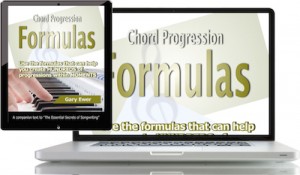When was the last time you put your inner student to work and analyzed a song?
If you’re like most songwriters, the act of writing itself is how you learn. As you work out melodies, lyrics and chords that partner up well with each other, you usually become better, assuming of course that you aren’t simply reinforcing errors in your process.
 “Chord Progression Formulas” is an eBook that shows you how you can make dozens of progressions within moments, using very simple formulas. It’s a must for songwriters who focus on chords as a first step in the songwriting process. Get it separately, or as part of “The Essential Secrets of Songwriting 10-eBook Bundle”
“Chord Progression Formulas” is an eBook that shows you how you can make dozens of progressions within moments, using very simple formulas. It’s a must for songwriters who focus on chords as a first step in the songwriting process. Get it separately, or as part of “The Essential Secrets of Songwriting 10-eBook Bundle”
But don’t ignore the benefits that come from musical analysis — the act of pulling a song apart, reverse engineering it, and discovering why you think it works.
If you’ve not done musical analysis like this before, here are some tips for getting the most out of putting your guitar and pencil down, and doing a bit of mind-based songwriting:
- Choose a song you’ve known for a long time, and give it a few listens.
- Focus on the lyrics. Compare verse and chorus, and try to figure out what makes them different. If the song uses a bridge, who do bridge lyrics differ from others within the song? Think about imagery, metaphors and other poetic devices.
- Focus on the melodies. How many different melodies does your chosen song use? How are they the same — how are they different? Does one use more leaps than steps, while another use more steps than leaps? Try to identify the parts you enjoy the most, and figure out what makes them so enjoyable.
- Focus on the chords. Does the verse and chorus use the same chords? If different, can you identify what makes one sound good for a verse, while the other is good for a chorus? Is there a difference in how frequently the verse chords change when compared to how frequently they change for the chorus.
And then beyond all this, you can make a list of questions that might pertain to the particular song you’ve chosen to analyze. These questions might concern aspects such as backing vocals, instrumentation, or features of song form/design.
You can do this kind of analysis by writing down your ideas in a kind of essay, or perhaps in point form. You might choose to analyze these songs by speaking your thoughts into a sound file, or by keeping a songwriting blog.
Each time you do this, you will likely learn something about songwriting that you didn’t know before, and you get the benefit of learning from a successful song, not through your own songwriting process.
And it’s a great activity to do at those times when you might be feeling a bit of writer’s block creeping up on you.
So today might be a good day for you to put your guitar down and pick up a pencil, and concentrate on listening.
 Written by Gary Ewer. Follow Gary on Twitter.
Written by Gary Ewer. Follow Gary on Twitter.
 “The Essential Secrets of Songwriting” eBook bundle includes“Writing a Song From a Chord Progression”. Discover the secrets of making the chords-first songwriting process work for you.
“The Essential Secrets of Songwriting” eBook bundle includes“Writing a Song From a Chord Progression”. Discover the secrets of making the chords-first songwriting process work for you.










